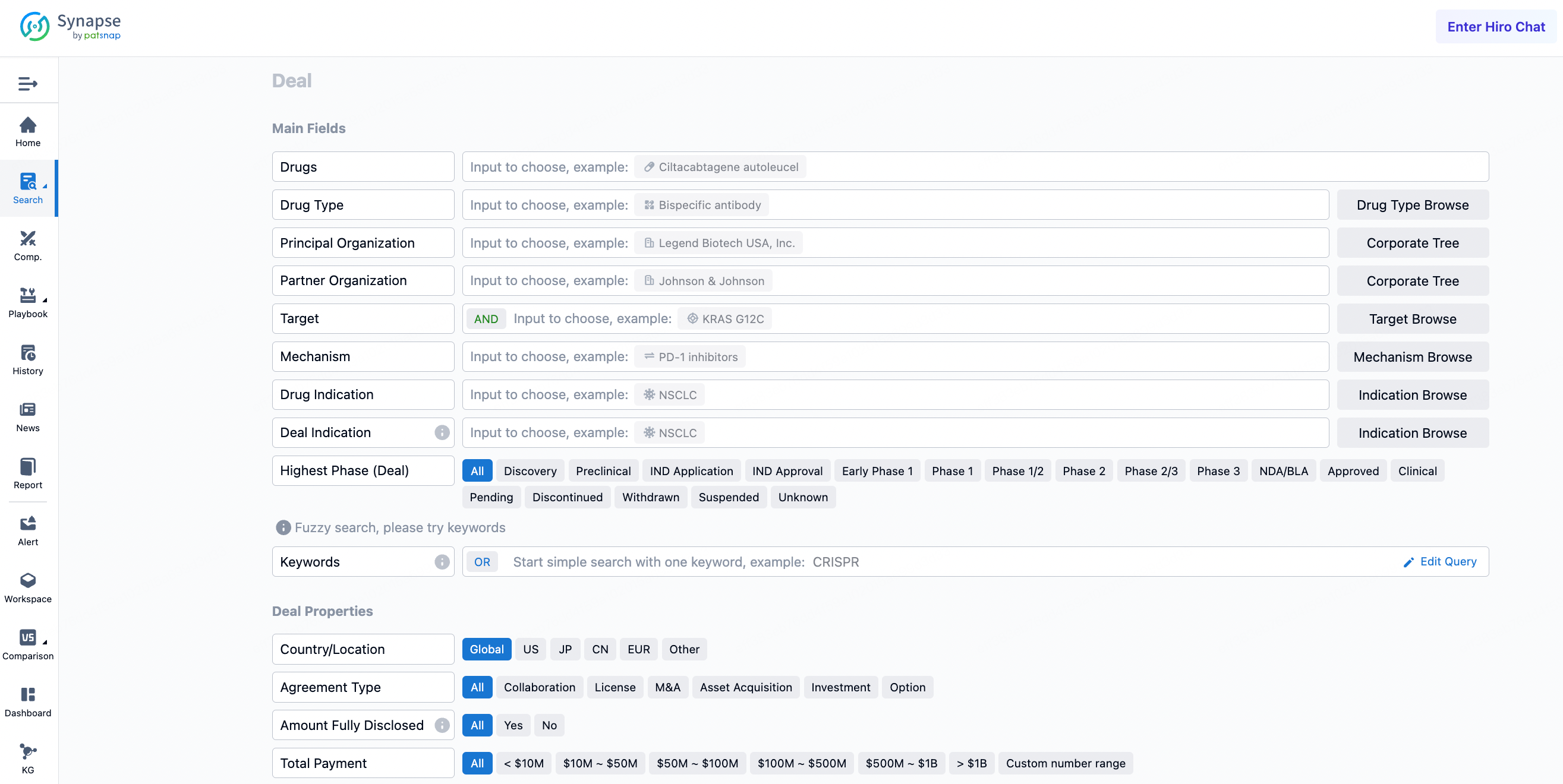Global Pharmaceutical Industry Financing Transactions Weekly Report (9.9-9.15)
Pharmaceutical licensing collaboration
1.Roivant Sciences Partners with Bayer
On September 10, Roivant Sciences announced that it has obtained global rights to Bayer's soluble guanylate cyclase (sGC) activator, Mosliciguat. Bayer will receive an upfront payment of $14 million and up to $280 million in development, regulatory, and commercialization milestone payments. On the same day, Roivant Sciences announced the creation of a new subsidiary, Pulmovant, which will focus on the development of Mosliciguat.
Mosliciguat is currently under development for the treatment of pulmonary arterial hypertension associated with interstitial lung disease (PH-ILD). Results from the Phase 1b proof-of-concept ATMOS study showed that at doses of 1 mg, 2 mg, and 4 mg, Mosliciguat reduced pulmonary vascular resistance by an average of 25.9%, 38.1%, and 36.3%, respectively, compared to baseline.
2.Gilead Sciences Partners with Genesis to Develop Novel Small Molecule Therapies
On September 10, Gilead Sciences and Genesis Therapeutics announced a strategic collaboration to discover and develop novel small molecule therapies targeting multiple pathways. The partnership will leverage Genesis' artificial intelligence platform, GEMS, to assist in generating and optimizing molecules for Gilead's selected targets. The two companies will collaborate closely on preclinical research, with Gilead retaining exclusive rights to the potential clinical development and commercialization of any compounds developed through the partnership.
Under the agreement, Genesis will receive a $35 million upfront payment and is eligible for additional preclinical, development, regulatory, and commercialization milestone payments. If Gilead successfully commercializes any collaborative products, Genesis will also be eligible for tiered royalties on net sales.
3.ITM Partners with Debiopharm
On September 10, ITM announced a collaboration with Debiopharm, acquiring global exclusive development and commercialization rights for Debiopharm’s radiopharmaceutical program. This program combines the therapeutic compound Debio 0228 and the diagnostic imaging agent Debio 0328, both targeting carbonic anhydrase IX (CA IX). Under the agreement, Debiopharm will receive approximately €300 million in upfront, development, and regulatory milestone payments, as well as commercial milestones and low double-digit royalties on future sales.
Debio 0228/0328 is a pair of investigational therapies. Debio 0328, a PET imaging agent that can be used independently, is designed to identify cancer patients who overexpress CA IX. Once identified, these patients can be treated with the lutetium-labeled radioligand Debio 0228, which aims to deliver targeted radiation to tumors for internal destruction. The program is currently being evaluated in a Phase 1/2 clinical trial for the treatment of clear cell renal cell carcinoma, pancreatic ductal adenocarcinoma, and colorectal cancer.
4.Novo Nordisk Reaches Another Agreement with Kallyope
On September 10, Kallyope announced a licensing agreement with Novo Nordisk, under which Novo Nordisk exercised its option to use ligands identified by Kallyope for therapeutic development, including potential treatments for obesity. Novo Nordisk will be responsible for preclinical and clinical development, manufacturing, and commercialization, while Kallyope will receive upfront payments and may receive additional milestone payments and royalties based on sales.
The two companies had previously collaborated to leverage Kallyope's Klarity platform to identify peptide-based therapies with the potential to improve obesity treatment outcomes. Preclinical data generated during this research suggested that ligands identified by Kallyope may have a beneficial effect on obesity patients.
5.Sanofi Enters Collaboration on Radioligand Therapy
On September 12, Sanofi announced an exclusive licensing agreement with RadioMedix and Orano Med to jointly develop radio-ligand therapies (RLT) based on lead isotopes for cancer treatment. Under the agreement, RadioMedix and Orano Med will receive an upfront payment of €100 million and up to €220 million in sales milestone payments.
The collaboration primarily focuses on the late-stage clinical program AlphaMedix, an alpha particle-based targeted therapy (TAT). Early clinical trials have demonstrated good tolerability and significant tumor burden reduction, with a 62.5% response rate among patients. The U.S. FDA recently granted breakthrough therapy designation to AlphaMedix for the treatment of gastrointestinal and pancreatic neuroendocrine tumors in patients who have not previously received peptide receptor radioligand therapy. The drug is currently nearing the completion of its Phase 2 clinical trial.
6.Harbour BioMed Partners with Umoja Biopharma
On September 13, Harbour BioMed announced a multi-target antibody development collaboration with Umoja Biopharma. The partnership will leverage Harbour BioMed’s proprietary fully human heavy chain antibody (HCAb) platform to produce novel in vivo CAR-T cell therapies, further expanding the potential applications of this innovative delivery technology. The fully human HCAb features a compact size, simple structure, and precise binding capabilities, significantly reducing antibody immunogenicity while enhancing the flexibility and diversity of CAR design.
7.ENCell Partners with Lucy Biotech
Recently, ENCell announced that it has signed a licensing and strategic alliance agreement with Lucy Biotech for the next-generation mesenchymal stem cell therapy, EN001. The agreement grants Lucy Biotech the rights to develop and commercialize EN001 in six Asian regions and countries, including Hong Kong, Taiwan, Macau, Vietnam, Thailand, and Singapore. According to the agreement, ENCell will receive an upfront payment of $1.5 million, as well as up to $18 million in milestone payments and royalties based on sales.
EN001 is a clinical-stage mesenchymal stem cell therapy candidate produced from mesenchymal hematopoietic stem cells obtained in the early cultivation phase. Preclinical studies have shown that this product has potential in regenerating damaged nerves and muscles. The company has completed a Phase 1a clinical trial for patients with Charcot-Marie-Tooth disease type 1a and is currently conducting a Phase 1b trial for patients with Charcot-Marie-Tooth disease type 1A.
Pharmaceutical Financing Events
1.Superluminal Medicines Completes $120 Million Series A Funding Round
On September 9, Superluminal Medicines announced the completion of a $120 million Series A funding round. The round was led by RA Capital Management, with participation from Insight Partners, NVentures, Eli Lilly, Gaingels, and others. The funds raised will support the company's lead projects entering the clinical development stage and increase the number of projects focusing on high-value G protein-coupled receptor (GPCR) small molecule drug discovery.
Established in 2023, Superluminal focuses on membrane receptors that mediate cell signaling and the fundamental physiological responses in humans, constituting major categories of drug targets including GPCRs, ion channels, and transport proteins. The company's technology platform rapidly develops candidate compounds through an integrated approach combining expertise in biology and chemistry, machine learning, and proprietary big data infrastructure. Currently, the company is advancing six small molecule projects.
2.Bambusa Therapeutics Announces Completion of Approximately $15 Million Seed Funding Round
On September 9, Bambusa Therapeutics has announced the completion of a seed funding round amounting to approximately $15 million. The round was co-led by BVF Partners and Dawn Biopharma, with participation from Salvia GmbH and INCE Capital. The funds raised will be used to accelerate the development of Bambusa’s bispecific antibody pipeline for Phase 1 clinical studies.
Founded by a group of industry experts and scientific innovators, Bambusa aims to transform the treatment landscape for immunological and inflammatory diseases. The company leverages validated targets and employs innovative antibody engineering to create bispecific antibody therapies.
3.Candid Therapeutics Raises Over $370 Million
On September 9, Candid Therapeutics announced it had raised more than $370 million in funding. The company is developing T-cell engager (TCE) antibodies that target specific B-cell populations for the treatment of autoimmune diseases. Through a three-way merger and multi-step financing, Candid acquired Vignette Bio and TRC 2004, gaining access to two TCE products—CND106 and CND261.
CND106 is a BCMA/CD3 bispecific antibody, with Vignette Bio obtaining exclusive rights for its development and commercialization outside of Greater China through a collaboration with EpimAb Biotherapeutics. CND261 is a CD20/CD3 bispecific antibody, and TRC 2004 secured global exclusive licensing rights outside Greater China through a partnership with Genor Biopharma. Both products have completed Phase 1 dose-escalation studies.
4.JHM Biopharm Completes Over 200 Million RMB Series B+ Funding
On September 10, JHM Biopharm announced that it had completed a Series B+ funding round exceeding 200 million RMB, led by SDIC Unity Capital. This follows the 100 million RMB Series B funding raised in late May from Tonghua Dongbao. The funds from this round will primarily be used to further advance the company’s pipeline and accelerate industrialization and commercialization efforts.
Founded in November 2020, JHM Biopharm focuses on the development of innovative recombinant protein drugs and synthetic biology products in the fields of serious medical conditions, consumer healthcare, and metabolism. The company's main pipeline products include recombinant human type I collagen, recombinant human type III collagen, recombinant type A botulinum toxin, recombinant human growth hormone injections, and long-acting recombinant growth hormone. Notably, the Phase 2 clinical trial for recombinant type A botulinum toxin in treating moderate-to-severe glabellar lines in adults is nearing completion, with plans to enter Phase 3 trials soon.
5.Epsilogen Completes £12.5 Million Series B Expansion Financing
On September 10, Epsilogen announced the completion of a £12.5 million Series B expansion financing round, bringing the total Series B funds raised to £43.25 million. The round saw participation from investors including British Patient Capital, Novartis Venture Fund, Epidarex Capital, 3B Future Health Fund, and ALSA Ventures.
The funds from this round will be primarily used to progress the Phase 1b trial of the immunoglobulin E (IgE) antibody MOv18 IgE for the treatment of platinum-resistant recurrent ovarian cancer (PROC) to achieve proof of concept, as well as to further develop the company's IgE-based pipeline. MOv18 IgE is the first therapeutic IgE antibody to enter clinical trials, targeting the folate receptor alpha (FRα). In Phase 1 trials, the product has demonstrated good safety and tolerability, along with anti-tumor activity.
6.Base Therapeutics completes tens of millions of yuan in Series A2 financing
On September 12, Base Therapeutics announced the completion of a multi-million yuan Series A2 financing round led by the AEF Greater Bay Area Venture Fund (AEF GBA Venture Fund). The funds raised will be used to strengthen the R&D team, optimize the product pipeline, and accelerate clinical trials.
Established in 2021, Base Therapeutics focuses on foundational innovations in the field of gene editing. The company has developed the AccuBase base editing system, which enables efficient gene editing both in vitro and in vivo with zero off-target effects. Additionally, Base Therapeutics has also developed a range of leading-edge technologies including ePE, CasH gene editing technology, BEAT-CART technology, and in vivo targeted delivery technologies.
Leveraging these technologies, Base Therapeutics is developing the BASE-NK and in vivo base editing product pipelines. Among these, the most advanced, NK510 cell injection, has already been submitted for an IND in China. This product, based on base editing technology, is a natural killer (NK) cell product intended for the treatment of advanced solid tumors.
7.Vironexis Biotherapeutics Announces Completion of $26 Million Seed Funding Round
On September 13, Vironexis Biotherapeutics has announced the completion of a $26 million seed funding round. The round was led by Drive Capital and Future Ventures, with participation from Moonshots Capital and Capital Factory. Vironexis has developed the TransJoin adeno-associated virus (AAV) gene therapy platform and boasts over ten candidate products aimed at treating hematologic cancers, preventing solid tumor metastasis, and developing cancer vaccines.
Among these, the lead gene therapy candidate, VNX-101, has been granted Fast Track and Rare Pediatric Disease designations by the FDA. Its Investigational New Drug (IND) application for the treatment of CD19-positive Acute Lymphoblastic Leukemia has also been approved by the FDA. The second project, VNX-202, targets the prevention of metastasis in HER2-positive cancers, including breast cancer and other tumor types, with Phase 1/2 clinical trials expected to commence in 2025.
8.Jingegg Biomedical has completed an A-round financing in the tens of millions of yuan
Recently, Jingegg Biomedical has announced the completion of a multi-million yuan Series A financing round. The round was led by Triwise Capital, with continued additional investment from existing shareholders, Longmen Capital Management and Technology Financial Group. The funds raised will primarily be used to advance the development of its core pipeline and accelerate collaborations with multinational pharmaceutical companies.
Founded in 2019, Jingegg Biomedical focuses on the research and development of innovative ion channel drugs for neuropsychiatric disorders and chronic kidney diseases. The company has established a technology platform for small molecule and protein drugs targeting ion channels, complemented by four major tool platforms, addressing the industry bottlenecks of low drug discovery success rate and significant side effects.
Click on the image below to explore new pharmaceutical funding transactions!




